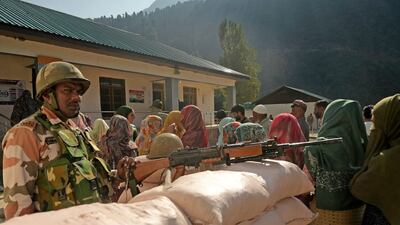Voters in Indian-administered Jammu and Kashmir are casting their ballots for the second phase of regional polls on Wednesday, after the first witnessed record turnouts.
The region, marred by years of conflict, is holding elections for the first time in a decade since Article 370, a special status of the region, was revoked in 2019.
The three-phase polls for the regional assembly began on September 18, with a 61 per cent voter turnout. The polls will conclude on October 1 and the results will be announced on October 8, the Election Commission of India said.
Voting is under way in 26 assembly constituencies in six districts – three in Kashmir Valley and three in the Jammu division. More than 2.5 million voters are registered for Wednesday's polls.

A total of 8.7 million voters, comprising 4.5 million males and 4.2 million females, are registered to vote in the three phases.
Former Jammu and Kashmir chief minister Omar Abdullah, of the National Conference party, and Bhartiya Janata Party’s J&K Chief Ravinder Raina are among the key candidates in the second phase.
The disputed Muslim-majority region was divided between India and Pakistan since the subcontinent gained independence from British colonial rule in 1947. Both nations claim it in its entirety. An armed rebellion against India has been waged since the late 1980s, with tens of thousands of people, mostly civilians, killed, amid regular poll boycott campaigns by separatists.
The last local election in the region was held in December 2014, with the popular government stepping down in 2018 when Prime Minister Narendra Modi’s BJP pulled out of an alliance with a local party. The region has had no elected government since it was brought under federal rule by Mr Modi’s government. In August 2019, the state was divided into federal administered regions of Jammu, Kashmir, and Ladakh.
All regional parties have promised to work to restore the statehood and special status of the region.
The new government will have decision-making powers only, limited to the region's civic affairs and public administration, with Mr Modi’s government having absolute powers over the federal territory's law and order.

Regional leaders criticised New Delhi over a 16-member diplomatic delegation that is visiting the region as “election observers”. The diplomats from the US, Singapore, and other nations based in their missions in capital Delhi arrived in the region on the invitation of the Ministry of External Affairs.
The move has irked regional leaders, including Mr Abdullah, who said polls in Kashmir were an “internal matter” that did not require foreign observers.
“I don't know why foreigners should be asked to check elections here,” he said. "When foreign governments comment, then the government of India says 'this is an internal matter for India' and now suddenly they want foreign observers to come and look at our elections."


